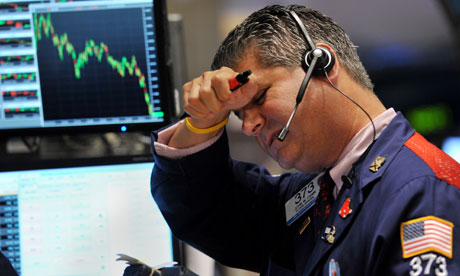What Is Going On With Stocks and What Does It Mean?

What Is Going On With Stocks and What Does It Mean?
By: Patrick Hedger, Policy Director-American Encore
The recent panic on Wall Street undoubtedly has many Americans quite nervous about the state of our economy. This issue can be pretty confusing for those not intimately involved with the stock market or following it, so here is a little background and a theory as to what is happening:
What’s the main issue here? The trigger for this entire crisis is the slowdown of China’s economy. China is an enormous market for goods and services. Its economy is second in size only to the United States. Many US companies sell products to Chinese buyers, like Apple for example. When China’s economy is weak, their people begin to save money and delay purchases just like anyone else. Given China’s very robust growth over the past several years, it has been responsible for significant portions of the growth of US companies who do business there. The US economy, by contrast, has barely been growing since the 2007-2008 financial crisis.
What’s causing China’s slowdown? There are likely a number of factors at play here but one obvious one is China’s housing bubble. You may have seen news stories about Chinese “ghost cities” which show massive cities with big towers that are completely empty. The reason these exist is because Chinese laws make it very difficult to invest wealth in ways that Americans traditionally do. Thus, Chinese families have been buying real estate instead. They’ve essentially fallen for the same trick Americans did prior to our housing bubble bursting, which is the false claim that “real estate prices never go down.” The only difference is the scale, as China’s real estate bubble is far more dramatic given that it is one of the few sectors in which the average Chinese person is allowed to put their wealth.
In addition, Chinese wealth is being adversely impacted by currency manipulation by their government. Pursuing a policy to encourage high levels of employment, the Chinese government has suppressed the value of its currency. This makes Chinese exports cheaper and increases the demand for them. This in turn creates demand for domestic employment. The other side of this coin is that it destroys the purchasing power of Chinese citizens. Goods and services originating outside of their economy become much more expensive because their currency can purchase less of the other nation’s currency needed to buy the given product, hence the difficulty for American companies hoping to sell there.
Why does this impact the US markets? In addition to the reasons listed above, regarding the Chinese market, US companies, and currency issues, the slowdown of the Chinese economy hurts American investors for reasons related to both the commodities market and the US Federal Reserve. First, commodities are things like gold, oil, steel, etc. Prices for these things go up when there is a high level of demand. China’s huge level of construction created high demand for commodities like oil and steel, keeping those prices high. If their housing bubble is bursting, then construction is slowing; meaning demand for these things is falling along with their prices. Investments made in these sectors are thus losing value.
This creates a problem because the commodities market was one of the few areas left for American investors to see an appreciable rate of return. This relates to the US Federal Reserve and its current policy. In response to the financial crisis of 2007-2008, the Federal Reserve has kept interest rates very low. This means that saving money at banks or loaning money yields a very low rate of return. Thus, investors have sought other areas to put their money. One is the commodities market; another is the stock market. This is part of the reason why stocks were so high prior to this week. Demand for stocks was huge given that investors were looking for places where they could actually expect something of a return. In effect, the Federal Reserve created huge demand for stocks.
Yet now, with such a huge market for American companies beginning to slow, stock prices have begun to fall creating a serious problem for US investors. With interest rates as low as they are, on top of stocks and commodities prices falling because of the Chinese slowdown, there doesn’t seem to be a good place for American investors to put their money and expect appreciable returns.
What’s the solution to avoid disaster? The worst thing that can happen is that investment slows to a level where the economy ceases to grow, bringing on a recession or even a depression. Of course, we can’t control what the Chinese do with their currency and other economic policies. Thus, we need to focus on growth here at home. A good step would be to reduce regulations and tax burdens that deter domestic business investments. Once things begin to improve, letting interest rates adjust higher and more freely in the future will provide a place for people to put their money with greater confidence and reasonable growth expectations. This would provide much needed stability for our economy as well as investment capital for companies without access to Wall Street.







